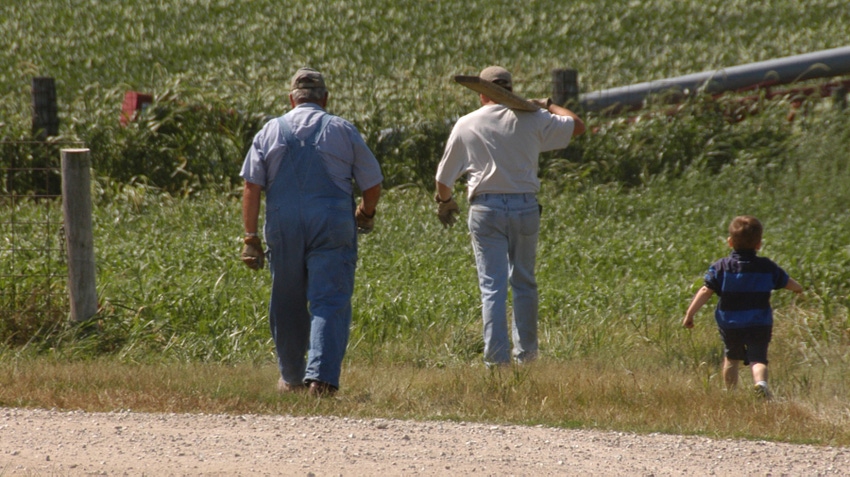
Twenty-three or so years ago, I started this column to write about our generation joining the farm. Our perspective on agriculture. What it was like to work with our parents and what we wished they knew.
Now our 18-year-old is talking about joining the farm and my, how the tables have turned. Now we’re the ones smiling at his big ideas. Wondering how he thinks that could possibly work. Talking through the possibilities. Our lens is shifting, seeing the farm through his eyes.
I listened this past spring as Cheryl Mitchell spoke to a group of farm women. Mitchell is a relationship analyst and speaker who talked specifically about the five different generations in the American workforce today. Yes, five. Look around. It’s real, and especially on the farm, where folks don’t really retire.
Her message: Stop judging each other, empathize and talk more. When you can see the world through someone else’s lens, everything changes for the better — even on the farm.
If only it were that easy! But here’s the thing. I listened and recognized just about everybody I know. You may be one of these five generations:
Traditionalists. Born from 1925 to 1945, they’re dependable, straightforward, loyal. Their worldview is shaped by the Great Depression, World War II, radio and movies. They’re motivated by respect, recognition and providing long-term value to a company or an organization. (“They stay 40 years, get their pension and by God, don’t leave,” Mitchell cracked.) They communicate with handwritten notes. They believe in obedience over individualism. Age equals seniority. You advance through the hierarchy, and there ain’t no skipping steps. They wanted stability following WWII. On our farm, this is my in-laws, the picture of relentless steadfastness.
Baby boomers. Born from 1946 to 1964, they’re optimistic, competitive, workaholics and team-oriented. Their worldview was shaped by the Vietnam War, the Civil Rights movement and Watergate. They’re motivated by loyalty, teamwork and duty. They communicate with whatever’s most efficient, including phone calls and face-to-face. They believe achievement comes after you pay your dues, and success requires sacrifice.
Sixty-five percent of Boomers plan to work past 65, so they’re going to be in the workplace a long time. Still, 10,000 Boomers reach retirement every day.
Generation X. Born from 1965 to 1980, they’re flexible, informal, skeptical, independent. Their worldview was shaped by the AIDS epidemic, the fall of the Berlin Wall and the dot-com boom. They’re motivated by diversity, work-life balance and personal professional interest rather than the company's interest. They communicate with whatever’s most efficient. They believe in diversity and are quick to move on if their employer fails to meet their needs. They resist change at work if it affects their personal lives. They want immediate feedback, work-life balance and personal development opportunities.
Gen Xers will outnumber baby boomers by 2028, and they make up 55% of all startup founders. On our farm, this is me and my husband, and we’ve spent a good chunk of the past 25 years working out a work-life balance.
Millennials. Born from 1981 to 2000, they’re competitive, civic, open-minded and achievement-oriented. Their worldview has been shaped by Columbine, 9/11 and the internet. They’re motivated by responsibility, the quality of their manager and unique work experiences. They communicate via instant messages, text and email. They believe in work-life balance and in seeking challenge, growth and development. And they’re likely to leave an organization if they don’t like a change.
Employers should get to know them personally, manage by results, offer a flexible work schedule and provide immediate feedback. Seventy-five percent of the global workforce will be made up of millennials by 2025.
Gen Z. Born from 2001 to 2020, they’re global, entrepreneurial and progressive. They’re driving the gig economy, meaning they have a constant side hustle. Their worldview was shaped by the post-9/11 cultural focus on safety, the Great Recession and access to technology from a young age. They’re motivated by diversity, personalization, individuality and creativity. They communicate via instant message, texting and social media snaps. They self-identify as digital-device addicts (and want something more), value independence and individuality, and they’ve grown up learning anyone can barge into their school and shoot them — which may be why they struggle with anxiety.
They prefer to work with millennial managers, innovative co-workers and new technologies. On the job, offer them opportunities to work on multiple projects at the same time. Provide a work-life balance and allow them to be self-directed and independent. On our farm, this is our children, ages 20, 18 and 15.
I can’t help but read these motivations and get a better understanding of why each of us do what we do. Looking through a different lens, the disagreements of 20 years ago make more sense. The conversations and blank looks today make more sense, too. And with any luck at all, we can work even better with the next generation, or with the folks we hire.
The more we learn about each other, especially in family business, the better chances we have to succeed — not only on the farm but also in life.
Did you find yourself and others on this list? Did any characteristics surprise you? Other comments? Email [email protected].
About the Author(s)
You May Also Like






